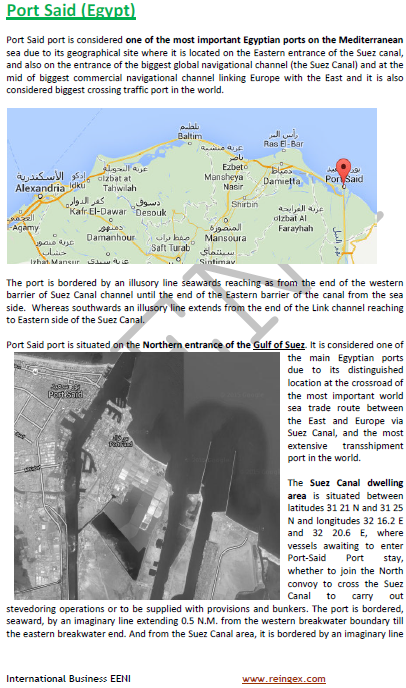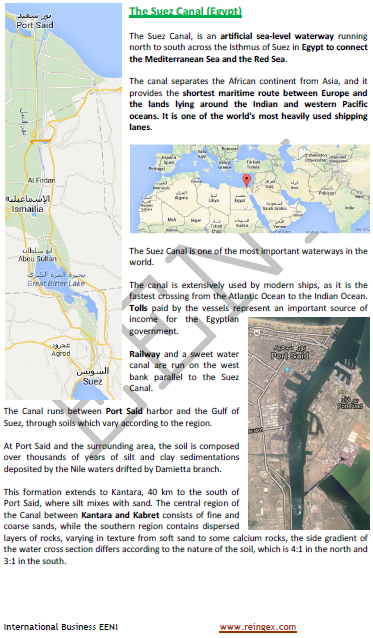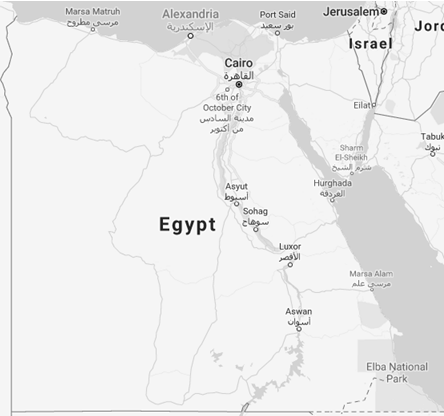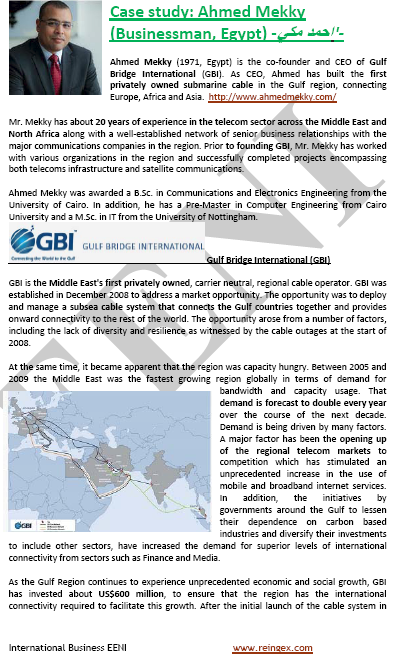Foreign Trade and Transport in Egypt, Cairo, Alexandria
Egypt (Business) Shubra El Kheima, Port Said, Suez, Mansoura, Cairo

Egypt (the Arab Republic of Egypt) is a North-East African country
- جمهوريّة مصر العربيّة in Arabic
- Cairo is the economic, political and administrative capital of Egypt and the largest Egyptian city
- The largest cities of Egypt are Cairo, Alexandria, Shubra El Kheima, Giza, Port Said, Suez, El Mahalla El Kubra, Luxor, Mansoura and Tanta
- Other Egyptian cities are Asuyt, Isamilia, Faiyum, Zagazig, Damietta, Aswan, Minya and Damanhur
- Egypt share borders with Israel, Libya (1,115
kilometres), Palestine and Sudan (1,273 kilometres)
- Jordan is on the other side of the Gulf of Aqaba
- Opposite the Sinai Peninsula is Saudi Arabia
- The main Egyptian economic activities are agriculture, transport, industry and tourism(12.8 million tourists)
- The main crops are cotton, rice, wheat, corn, cane sugar, sugar beet, onion, tobacco and beans
- Revenue from the Suez Canal is one of the pillars of the Egyptian economy
The main industries are textiles, food processing, chemical and pharmaceutical products, cement and light manufactured products.
- Automotive Manufacturing: Nasr Automotive Manufacturing Company, Arab American Vehicles, Egy-Tech Engineering, Ghabbour Group, WAMCO (Watania Automotive Manufacturing Company) and MCV
- Abu Qir Fertilizers is one of the largest producers of nitrogen fertilizers in Egypt
- Olympic Group is the largest Egyptian company in household appliances.
- Bahgat Group is a leading company in electronics, appliances, furniture and real estate.
- Orascom Construction Industries is the largest engineering, procurement and construction company
- Talaat Moustafa Group is one of the largest conglomerates in Egypt
Logistics and Transportation in Egypt


 Egyptian Students from Egypt
Egyptian Students from Egypt


More information: International Trade and Business in Egypt, at EENI Global Business School Website.
Egyptian Economy
- The Egyptian main mineral resources are oil, natural gas, phosphates,
gold and iron ore.
- Coal deposits in north-east Sinai
- Oil and gas are produced in the western desert regions, the Gulf of Suez and the Nile delta.
- Egypt has a huge gas reserves
- The largest Egyptian companies are Orascom Group and Raya Contact Centre
- Cairo Stock Exchange
- Currency of Egypt: Egyptian pound
- The Egyptian legal system is based on the Islamic and civil law (Napoleonic
codes)
- Islamic Jurisprudence (Fiqh) is the main source of the Egyptian law

Egyptian population: 97 million Egyptian
- 1960: 20 million Egyptian
- 2006: 73 million Egyptian
- Egypt is the most populous North African and Arab country
- Egypt is the third most populous African Country, after Nigeria and Ethiopia
- The vast majority of Egyptians live on arable land near the Nile banks (40,000 km²)
- 98% of Egyptians live in 3% of the territory (Nile Delta and valley)
- Egyptian Diaspora: three million in Libya, Saudi Arabia, the Persian Gulf and Europe
- Population density of Egypt: 96 inhabitants / square kilometre
Ahmed Mekky (Cairo, Egyptian Businessmen)

- Area of Egypt: 1,001,459 km²
- The great regions of the Sahara desert, which make up most of the Egyptian territory, are sparsely populated
- Governorates of Egypt
- Egypt is a unitary semi-presidential Republic
- Independence of Egypt from the United Kingdom in 1922
- Sudan obtained are independence from the United Kingdom and Egypt in 1956
- Calling cod of Egypte: 20
- Country code top-level domain of Egypt: .eg
- Naguib Mahfouz, the first Arabic-speaking writer to win the Nobel Prize for Literature.
- Egypt was one of the first nation-states of the world in the tenth millennium BC
- Egypt was the cradle of the Egyptian Civilisation
- Greek, Persian, Roman, Arab, Ottoman, and Numidian influences
- Tarek Talaat Moustafa (Cairo)
- Minoush Abdel-Meguid
- Hassan Abdalla (Cairo)
- Mohammed Mansour (Alexandria)
- Onsi Sawiris (Cairo)

Trade and Business Organisations (Egypt)
- Common Market for Eastern and Southern Africa (COMESA)
- United States-COMESA Agreement
- COMESA-EAC-SADC Tripartite Free Trade Agreement
- Community of Sahel-Saharan States (CEN-SAD)
- Nile Basin Initiative
- Conference on the Great Lakes Region (guest member country)
- Agadir Agreement
- European Union-Egypt Economic Partnership Agreement
- Euro-Mediterranean Partnership
- Islamic Development Bank
- Organisation of Islamic Cooperation (OIC)
- Arab League
- Greater Arab Free-Trade Area
- Economic and Social Commission for Western Asia
- EFTA-Egypt FTA Agreement
- Egypt-MERCOSUR Agreement
- Turkey-Egypt Free Trade Agreement
- United Kingdom-Egypt Free Trade Agreement
- Global System of Trade Preferences
- Protocol Relating to Trade Negotiations
- African Development Bank
- African Union
- AUDA-NEPAD
- Economic Commission for Africa
- Islamic Development Bank
- Organisation of Islamic Cooperation
- Arab League
- Afro-Arab Cooperation
Main Egyptian ethnic groups:
90% of the population is Egyptian and speaks the modern Egyptian Arabic.
- Arabic is the official language of Egypt
- English is widely understood
Copts represent approximately 10% of the Egyptian population

Religions and Global Business -
Religious diversity
Religions in Egypt:
- Sunni Islam (90% of the Egyptian population)
- Orthodox Coptic Christianity (10% of the Egyptian population)


 Tweet
Tweet


